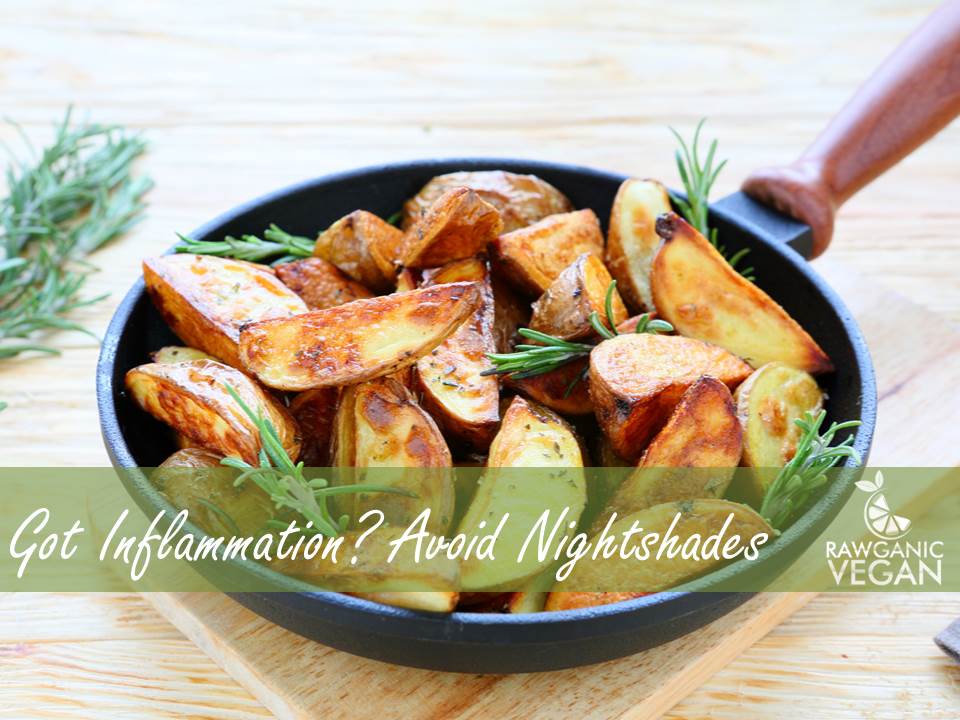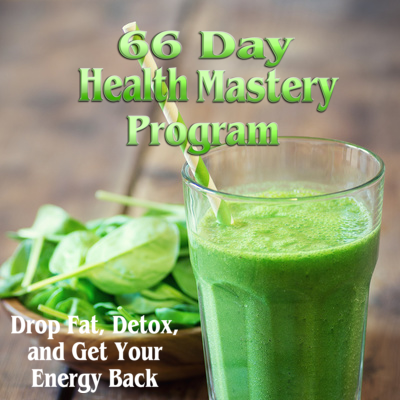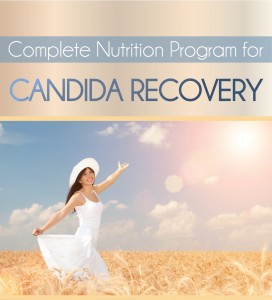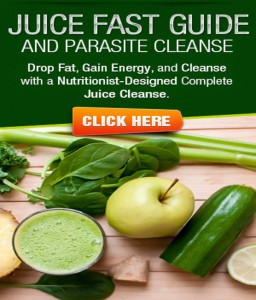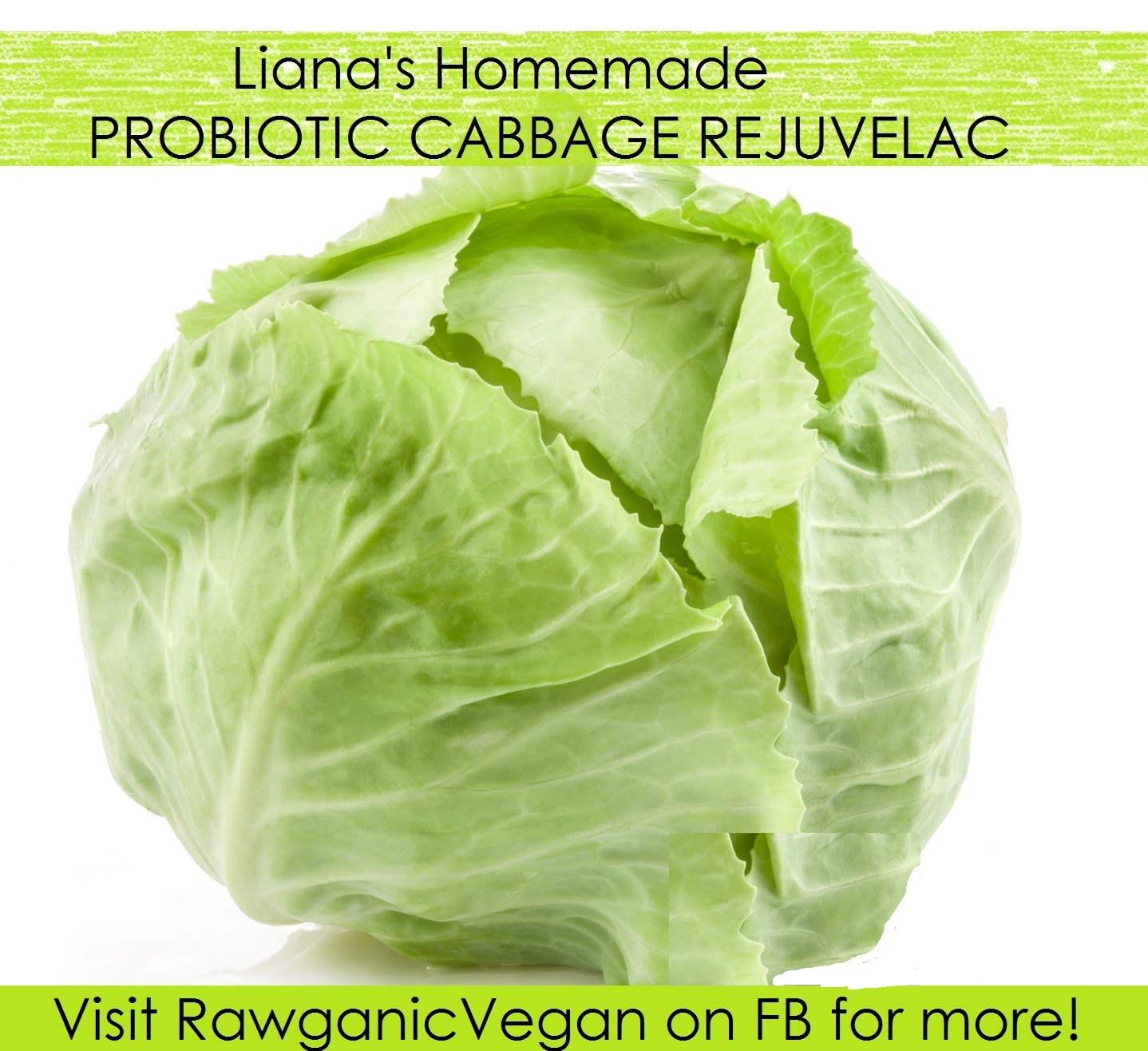There is a group of plants known as nightshades which should be avoided by anyone who has inflammation in the body, particularly in the joints. It is wise to completely avoid all nightshades if you have an autoimmune condition of any kind. Nightshades are some of the most commonly consumed fruits and vegetables, and even some very common herbs and spices.
- Joint pain
- Stiffness upon waking, or stiffness after sitting for longs periods of time
- Muscle pain and tension
- Muscle tremors
- Sensitivity to weather changes
- Poor healing
- Insomnia
- Skin rashes
- Heartburn
- Stomach discomfort
- Digestive difficulties
- Headaches
- Mood swings
- Depression
– See more at: http://www.phoenixhelix.com/2013/06/23/nightshade-free-survival-guide/#sthash.NLPyPcRq.dpuf
What Are Nightshades Anyway?
The following list of common foods and herbs are part of the nightshade or solanaceae family, and although certainly not poisonous, they do contain enough toxins to cause inflammation in some people. In practice most of my clients don’t even realize that they have an issue with nightshades until they stop consuming them for a few weeks. That’s when they notice a very pronounced change in how they feel. Here is the list:
- Tomatoes
- Tomatillos
- Potatoes
- Eggplants
- Peppers (bell peppers, banana peppers, chili peppers, etc.)
- Red pepper seasonings (paprika, chili powder, cayenne, curry, etc.)
- Pimentos
- Tamarillos
- Goji berries
- Ground cherries, which are similar to tomatoes, they are not cherries
- Ashwagandha
- Tobacco
- Also be aware of reading labels because the terms “spices” and “natural flavors” often actually contain the above seasonings/
- Be aware of “starch” on ingredient labels, because it often comes from potatoes.
Foods that are NOT nightshades:
- Sweet Potatoes
- Peppercorns (black, white and pink)
How Are They Harmful?
Nightshades only cause problems for certain people, not everyone will have an issue with these foods. However, all nightshades contain toxic compounds called alkaloids which occur naturally in the plants to protect them against insects by dissolving their cell membranes. In humans these alkaloids can have similar effects and result in inflammation, over-reaction in the immune system, and leaky gut syndrome (permeability in our intestinal membranes). All of these factors have been shown to contribute to autoimmune disorders. People with very strong digestion, low inflammation and vibrant immune systems can usually tolerate nightshades without any problems whatsoever. Here are some signs of nightshade sensitivity:
- Joint Pain (one of the most common signs)
- Stiffness upon waking or after sitting for a while
- Muscle pain and tremors
- Sensitivity to weather changes
- Poor healing
- Insomnia
- Skin rashes
- Heartburn
- Stomach and digestion issues
- Headaches
- Mood swings
- Depression
What Should I Do If I’m Not Sure?
What I always recommend is that you commit to completely eliminating nightshades from your diet for an entire month, including all paprika and spices mentioned above. Do not consume ANY. After the month is over bring them back into your diet by eating a few nightshades for at least 2-3 days. Eat some bell peppers, eggplant, tomatoes, goji’s etc… and then see how you feel. Did you feel better during the thirty day trial period? Did you have any kind of pain, stiffness, feeling moody or any of the above signs while you reintroduced them? If so you are nightshade sensitive. It’s really a simple procedure to test for yourself. Feel better without them? No more nightshades.
Be absolutely certain during your month-long elimination diet that you adhere 100%. Adding in the spices or “can’t I just have a little” will derail your attempt to discover how sensitive you are — if at all. When you COMPLETELY remove a food from your system you are simultaneously eliminating the chronic inflammatory and immune response. When the food is then reintroduced you will get a clear and acute reaction after having been “clean” for a while before.
There aren’t any hard core, peer reviewed scientific studies supporting the nightshade-inflammation connection because quite frankly, there is no funding to support that kind of research. A scientist by nature I always look for research and evidence. But in the case of nightshades and wellness I have a high percentage of clients with autoimmune disorders and inflammation who feel dramatically better when eliminating these foods. They want to feel good and so that’s all the “proof” they need.
Moving Forward Without Nightshades
If it turns out that you are in fact sensitive just be careful when you’re not cooking for yourself. Restaurants, delis and many other places have foods that contain nightshade spices, especially paprika which is used to color a number of foods. Swap out yams and sweet potatoes for everything you would have previously used a regular potato for, and use pepper and ginger to spice things up instead of hot peppers.
The only way to know is to eliminate them from your diet for at least 30 days. (No cheating.) Then, reintroduce them into your diet as a test: eat them at least 3 times over a 2-day period, and then stop eating them, and monitor your symptoms for 72 hours. Did you improve during the 30 days? Did you have a negative reaction when you ate them again? If yes, you’re nightshade-sensitive. If no, you’re not.
You’ll find articles on the internet saying there are no peer-reviewed studies to support the nightshade-inflammation connection. This is true, largely because there’s no profit to be made in that research and therefore no funding.
– See more at: http://www.phoenixhelix.com/2013/06/23/nightshade-free-survival-guide/#sthash.NLPyPcRq.dpuf
You may have heard of the term “deadly nightshade” referring to a plant called belladonna, which was used as a poison in ancient times. Lesser known are the commonly eaten vegetables in the same nightshade family. They aren’t deadly, but they contain enough toxins to cause inflammation in some people, particularly those with autoimmune disease. Often, we don’t realize just how much, until we stop eating them:
- Tomatoes
- Tomatillos
- Potatoes
- Eggplants
- Peppers (bell peppers, banana peppers, chili peppers, etc.)
- Red pepper seasonings (paprika, chili powder, cayenne, curry, etc.)
- Pimentos
- Pepinos
- Tamarillos
- Goji berries
- Ground cherries (similar to tomatoes, they have no relationship to fruit cherries)
- Ashwagandha (an ayurvedic herb)
- Tobacco
- Read labels: terms like “spices” and “natural flavors” often contain the above seasonings, and “starch” often comes from potatoes.
Similar sounding foods that are not nightshades:
- Sweet Potatoes
- Peppercorns (black, white and pink)
How Are They Harmful?
First of all, nightshades aren’t harmful to everyone, but they are often harmful to people with autoimmune disease.
These vegetables all look so different, it’s surprising to discover they’re all part of the same Solanaceae family. They all contain toxic compounds called alkaloids. In nature, these protect the plants against insects, by poisoning the insect and dissolving its cell membranes. Unfortunately, alkaloids can have a similar effect in humans, increasing our inflammation, overactivating our immune system, and causing permeability in our intestinal membranes (known as leaky gut), all of which contribute to autoimmune disease. If someone’s healthy, with low inflammation in their body, a balanced immune system, and a healthy and strong digestive tract, they can often eat nightshade vegetables without a problem. However, people with autoimmune disease are vulnerable, and nightshades often exacerbate symptoms.
– See more at: http://www.phoenixhelix.com/2013/06/23/nightshade-free-survival-guide/#sthash.NLPyPcRq.dpuf
You may have heard of the term “deadly nightshade” referring to a plant called belladonna, which was used as a poison in ancient times. Lesser known are the commonly eaten vegetables in the same nightshade family. They aren’t deadly, but they contain enough toxins to cause inflammation in some people, particularly those with autoimmune disease. Often, we don’t realize just how much, until we stop eating them:
- Tomatoes
- Tomatillos
- Potatoes
- Eggplants
- Peppers (bell peppers, banana peppers, chili peppers, etc.)
- Red pepper seasonings (paprika, chili powder, cayenne, curry, etc.)
- Pimentos
- Pepinos
- Tamarillos
- Goji berries
- Ground cherries (similar to tomatoes, they have no relationship to fruit cherries)
- Ashwagandha (an ayurvedic herb)
- Tobacco
- Read labels: terms like “spices” and “natural flavors” often contain the above seasonings, and “starch” often comes from potatoes.
Similar sounding foods that are not nightshades:
- Sweet Potatoes
- Peppercorns (black, white and pink)
How Are They Harmful?
First of all, nightshades aren’t harmful to everyone, but they are often harmful to people with autoimmune disease.
These vegetables all look so different, it’s surprising to discover they’re all part of the same Solanaceae family. They all contain toxic compounds called alkaloids. In nature, these protect the plants against insects, by poisoning the insect and dissolving its cell membranes. Unfortunately, alkaloids can have a similar effect in humans, increasing our inflammation, overactivating our immune system, and causing permeability in our intestinal membranes (known as leaky gut), all of which contribute to autoimmune disease. If someone’s healthy, with low inflammation in their body, a balanced immune system, and a healthy and strong digestive tract, they can often eat nightshade vegetables without a problem. However, people with autoimmune disease are vulnerable, and nightshades often exacerbate symptoms.
– See more at: http://www.phoenixhelix.com/2013/06/23/nightshade-free-survival-guide/#sthash.NLPyPcRq.dpuf
You may have heard of the term “deadly nightshade” referring to a plant called belladonna, which was used as a poison in ancient times. Lesser known are the commonly eaten vegetables in the same nightshade family. They aren’t deadly, but they contain enough toxins to cause inflammation in some people, particularly those with autoimmune disease. Often, we don’t realize just how much, until we stop eating them:
- Tomatoes
- Tomatillos
- Potatoes
- Eggplants
- Peppers (bell peppers, banana peppers, chili peppers, etc.)
- Red pepper seasonings (paprika, chili powder, cayenne, curry, etc.)
- Pimentos
- Pepinos
- Tamarillos
- Goji berries
- Ground cherries (similar to tomatoes, they have no relationship to fruit cherries)
- Ashwagandha (an ayurvedic herb)
- Tobacco
- Read labels: terms like “spices” and “natural flavors” often contain the above seasonings, and “starch” often comes from potatoes.
Similar sounding foods that are not nightshades:
- Sweet Potatoes
- Peppercorns (black, white and pink)
How Are They Harmful?
First of all, nightshades aren’t harmful to everyone, but they are often harmful to people with autoimmune disease.
These vegetables all look so different, it’s surprising to discover they’re all part of the same Solanaceae family. They all contain toxic compounds called alkaloids. In nature, these protect the plants against insects, by poisoning the insect and dissolving its cell membranes. Unfortunately, alkaloids can have a similar effect in humans, increasing our inflammation, overactivating our immune system, and causing permeability in our intestinal membranes (known as leaky gut), all of which contribute to autoimmune disease. If someone’s healthy, with low inflammation in their body, a balanced immune system, and a healthy and strong digestive tract, they can often eat nightshade vegetables without a problem. However, people with autoimmune disease are vulnerable, and nightshades often exacerbate symptoms.
– See more at: http://www.phoenixhelix.com/2013/06/23/nightshade-free-survival-guide/#sthash.NLPyPcRq.dpuf
You may have heard of the term “deadly nightshade” referring to a plant called belladonna, which was used as a poison in ancient times. Lesser known are the commonly eaten vegetables in the same nightshade family. They aren’t deadly, but they contain enough toxins to cause inflammation in some people, particularly those with autoimmune disease. Often, we don’t realize just how much, until we stop eating them:
- Tomatoes
- Tomatillos
- Potatoes
- Eggplants
- Peppers (bell peppers, banana peppers, chili peppers, etc.)
- Red pepper seasonings (paprika, chili powder, cayenne, curry, etc.)
- Pimentos
- Pepinos
- Tamarillos
- Goji berries
- Ground cherries (similar to tomatoes, they have no relationship to fruit cherries)
- Ashwagandha (an ayurvedic herb)
- Tobacco
- Read labels: terms like “spices” and “natural flavors” often contain the above seasonings, and “starch” often comes from potatoes.
Similar sounding foods that are not nightshades:
- Sweet Potatoes
- Peppercorns (black, white and pink)
How Are They Harmful?
First of all, nightshades aren’t harmful to everyone, but they are often harmful to people with autoimmune disease.
These vegetables all look so different, it’s surprising to discover they’re all part of the same Solanaceae family. They all contain toxic compounds called alkaloids. In nature, these protect the plants against insects, by poisoning the insect and dissolving its cell membranes. Unfortunately, alkaloids can have a similar effect in humans, increasing our inflammation, overactivating our immune system, and causing permeability in our intestinal membranes (known as leaky gut), all of which contribute to autoimmune disease. If someone’s healthy, with low inflammation in their body, a balanced immune system, and a healthy and strong digestive tract, they can often eat nightshade vegetables without a problem. However, people with autoimmune disease are vulnerable, and nightshades often exacerbate symptoms.
– See more at: http://www.phoenixhelix.com/2013/06/23/nightshade-free-survival-guide/#sthash.NLPyPcRq.dpuf

